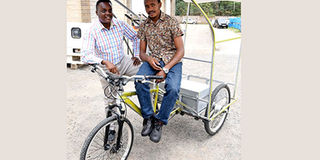Bike to supply cheap energy to Kenya’s rural homes

Solar e Cycle members Augustine Maranga (L) and Peter Mutai (R) who won the Valeo Innovation Challenge, a global innovation award in Paris for inventing a solar-powered bike during the interview at Strathmore University on October 19, 2018 DIANA NGILA | NAIROBI
What you need to know:
- Registration of the company, Solar e Cycles, is at an advanced stage - the team has also begun the process of patenting their idea.
The bikes will retail at Sh100,000.
Fancy a bike that easily carries weights of up to 150kgs and travels at 50kms per hour? Even better, you do not have to pedal it because the bike is powered by solar energy! That is not all. This bike produces enough energy to light your house for three days.
As the world gears towards the Sustainable Development Goal (SDG 7) of affordable and clean energy, three young Kenyans have invented and designed a multi-purpose solar-powered vehicle to supply cheap energy to Kenya’s rural homes and to ease transport as well.
Ignatius Maranga, 24, and Peter Mutai, 27, are graduates of electrical and electronics from Jomo Kenyatta University of Agriculture and Technology and Technical University of Mombasa respectively.
The pair, who graduated in 2017, work part-time at the energy research centre at Strathmore University while the third member, Samuel Ndung’u, is an accounting student at the university. Says Maranga,
“This project took four years to complete. We have been experimenting with different prototypes before we finally settled on the current design. We will keep modifying this model to attain the highest level of efficiency.”
Early this month, the team participated in and won the Valeo Innovation Challenge, a tough science contest organised by French multinational automotive supplier, Valeo, that encourages engineering students to innovate and develop new solutions in vehicle electrification, autonomous cars and digital mobility.
“We had five minutes to pitch our idea before a panel of judges in Paris, including CEOs of top technology firms in the world. We had to convince them why our idea was unique and worth investing in,” Maranga says.
The trio beat 676 other contenders from around the world, including participants from prestigious institutions in Europe and America. This anchored them on the path of winning the prize money of Sh 11660000, becoming the first outfit from Africa to win the award.
“We are going to use part of the money to put together a start-up business. Our immediate goal is to scale up production so that we can reach as many households as possible within the next few years,” Muitai says.
Registration of the company, Solar e Cycles, is at an advanced stage - the team has also begun the process of patenting their idea. The bikes will retail at Sh100,000.
A 2012 UN report shows that women in Sub-Saharan Africa spend a staggering 40 billion hours annually searching for water – an average of seven kilometres every day.
“Statistics show that 80 percent of Africa is not connected to the electricity grid. This forces women to spend even more time looking for energy (firewood) to light their homes. This gap is the selling point of our invention,” Maranga says.
He explains: “The bike has motors on each wheel, and is more like an off-road vehicle that can navigate any terrain with ease while carrying more weight than conventional bicycles. This makes it suitable for use in rural areas that do not have access to good roads. Its range is between 50 kilometres to 60 kilometres per day.”
So, how does this bike work?
“It is fitted with solar panels that charge batteries during daytime for propulsion. The stored energy is then used to provide light energy to homes at night. The batteries can go for a maximum of three days without having to recharge them,” Maranga explains.
In a daring expedition to test the vehicles’ adaptability to the harsh African roads, the team will from November embark on a two-month long-haul trip to South Africa, cycling for more than 6,000 kilometres to Cape Town. “We will also use the trip to create awareness among Africans on the importance of using renewable sources of energy such as solar energy. Our product targets African households, and it only makes sense to interact with our potential customers in their villages to demonstrate how the product works,” Maranga reveals.
But their first order of business is to deliver 10 such bikes to President Uhuru Kenyatta, who was impressed by the team’s work when he met small and medium enterprises (SMEs) last week at Strathmore University during the SMEs forum.
“The President rode on one of the vehicles and asked us to make 10 of them and deliver them to State House. This will be our first batch of bikes to sell,” Mutai says, adding that the earliest they can deliver this order is December of this year. The venture could not have got off to a more promising start, with the ambassador of Italy also making an order.
“We are running against time to meet these deadlines. We have the money to facilitate the assembly while Valeo has committed to provide the various parts for the work. We are, however, short of labour, and intend to hire more hands to deliver the orders in time,” Maranga explains.
Solar energy, they point out, is cheaper than other forms of energy and, therefore, the ultimate solution to poor Kenyan households that cannot afford to install electricity in their homes and to pay monthly power bills.
“These bikes could just be the answer to the inherent energy challenges in the country and on the continent,” Mutai reflects.





